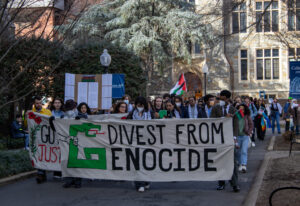Georgetown became one of the first private universities to introduce a plan to fully divest from fossil fuels on Feb. 6 following a board of directors vote. The university will phase out investments in publicly traded funds over the next five years and investments in private funds over the next ten.
The announcement from university President John DeGioia marked the culmination of a nearly decade-long push from GU Fossil Free (GUFF), urging the university to adopt a more environmentally friendly investment policy.
Divestment—which refers to the withdrawal of all stocks, bonds, or investment funds from an industry, often for ethical reasons—has historically been a tactic for political change. While the term divestment is now commonly used to refer to divestment from the fossil fuel industry, it has been used to generate economic and social pressure on a number of issues, even at Georgetown.
In 1985, students occupied White Gravenor for two weeks, and though 85 activists were arrested in the process, they won a partial divestment of the university from companies invested in apartheid-era South Africa. At that time, one-eighth of Georgetown’s $80 million endowment was in those companies. The university only ended up divesting two million, or about one-fifth of their total investment in the country.
Movements to divest from oil and natural gas industries kicked off in universities at the dawn of the last decade with the first university divestment from Unity College in 2011. More than $11 trillion in assets has been withdrawn from the industry by investors since the movement began.
Georgetown has an endowment of $1.9 billion, over 95 percent of which is invested. Though exact numbers for Georgetown’s current fossil fuel investments are not publicly available, a spokesperson said less than five percent of the endowment is currently invested in or involved with fossil fuels.
GUFF has been advocating for fossil fuel divestment since its founding in 2012, and in 2014 it secured a university divestment from coal. In January of last year, it submitted a proposal to the university to fully divest from all fossil fuel companies, including oil and gas. To expand on their January proposal, GUFF also presented the Committee on Investment and Social Responsibility (CISR) with a detailed policy memo in March 2019 outlining what the divestment process should look like. Given a lack of visible university response to the proposal since March, GUFF brought the issue to the student body in this year’s referendum.
“It seemed like we were being put to the side and stalled,” Victoria Boatwright (COL ’22), one member of GUFF, said. This semester, after they introduced the referendum, the club got their first substantive update in almost a year when university officials told them they would be presenting a modified version of GUFF’s proposal to the board of directors and expected it to pass. They did not tell GUFF when this new policy would be announced, only that the board meeting was also on Feb. 6.
The CISR group that created the proposal included students in the decision making process, a university spokesperson wrote in an email to the Voice. “As with prior issues, CISR took input from GUFF but ultimately crafted its own proposal that it deemed was feasible.”
When they met this fall, GUFF knew they wanted to show the broadest base of support possible to pressure the university. “Because we know that trying to pressure from all sides is important, with student support, we decided a student referendum would be a good way to do that,” Lucy Chatfield (COL ’22) said.
Hours after the university announced the divestment, voting closed on the student referendum on divestment from fossil fuels. Just over 90 percent of students voted in favor of the referendum, the GUSA Election Commission announced on Twitter.
While GUFF was overwhelmingly pleased to hear the university would be divesting, Boatwright said there was also a tinge of disappointment that the referendum results were overshadowed. GUFF members found out the divestment policy was being announced only 10 minutes before the email was sent out to students.
“The hope was that we would be involved with the entire process,” Boatwright said. “I think that process was just a little odd.”
***
But working with the administration to put a proposal before the board would have been unheard of when GUFF was founded eight years ago. Celia Buckman (SFS ’21) described the original members as “radical activists.” In 2015, they interrupted an event with World Bank president Jim Yong Kim in Gaston Hall during a portion on climate change. The three students, who were charged with Code of Conduct violations, wished to use the platform Kim had to spread their message. They regularly held rallies and sit-ins in the president’s office.
Eventually, the group’s tactics turned to the GUFF model seen today. The first full divestment proposal was submitted in 2014 and called for the university to divest from the 200 largest fossil fuel companies. In 2015, the university responded by announcing they would be divesting from coal. Most recently, the university announced they would divest from tar sands in 2018, following a proposal from GUFF.
Through the experience of fighting for coal divestment, GUFF realized there were no concrete processes for submitting proposals regarding the endowment. The group helped write bylaws for CISR, which had been given almost no guidance since its founding 30 years before. The CISR website describes its mission as “making recommendations as to the university’s voting of shareholder proxies as well as considering written proposals from members of the Georgetown community on issues related to socially responsible investment.”
In accordance with this mission, the university implemented a Socially Responsible Investing policy which was approved in 2017. According to the Georgetown Investment Office’s website, the policy serves to ensure investments are aligned with social justice and the common good.
Though university officials said it was coincidental that they made the announcement on the same day as the referendum, they credited GUFF for bringing forth the proposal in its announcement, nearly every measure of which was adopted by Georgetown. “Many members of our community contributed to our ongoing conversations around the impact of climate change and helped to ensure many perspectives were brought to the dialogue about divestment,” the announcement read.
In addition to divestment, the university promised to actively seek investments in the renewable and clean energy industry. “The university will continue to make investments that target a market rate of return in renewable energy, energy efficiency and related areas,” a Feb. 6 press release on read.
A university spokesperson described these steps as part of a larger university effort to invest in sustainable energy use on campus, which also includes the addition of electric GUTS buses and solar panels for the downtown Capitol Applied Learning Lab center.
On Jan. 16, CISR unanimously recommended the university divest and largely adopted GUFF’s recommendations. It promises a full divestment in 10 years rather than the five the group originally demanded, due to the time it takes to remove funds from private investments, and allows for some exceptions to the policy on a case-by-case basis if an otherwise promising investment has limited exposure to fossil fuels. The university did not provide a specific percent that would be considered, but assured it would be limited.
The university said they would be defining fossil fuel companies as those whose primary business is the extraction and sale of oil and natural gas. It does not include the development of clean energy standards or include students in the decision-making process, as proposed by GUFF.
But some students were skeptical about the effects divestment would actually make. In a Jan. 20 GUSA Senate meeting, Sen. Harrison Nugent (SFS ’20) questioned the efficacy of the referendum in actually decreasing investment in fossil fuels. “At the end of the day, global demand for fossil fuels aren’t really decreasing drastically by Georgetown University divesting,” he said.
Buckman addressed this concern and others at the teach-in GUFF hosted on divestment and environmental justice a week before the referendum. She acknowledged that divestment may not reduce the profits of most fossil fuel companies. But she says that’s not the point of the movement. “People will buy Exxon Mobil shares,” she said, “It’s more that it should be socially unacceptable to buy Exxon Mobil shares.”
GUFF is used to responding to this argument. They’re also used to people asking if divestment will reduce the size of the endowment. According to Chatfield, in most cases, divestment does not make endowments smaller.
A 2019 study by C.J. Williams and Christopher Marsicano on the impact of divestment on university endowments bears out Chatfield’s claim. Though the study is fairly preliminary and cannot offer an analysis of long-term impacts, it found neither full nor partial divestment has any discernible effect on the endowment—either positive or negative. “Divestment does not appear to limit endowment returns in any of the institutions for which we conducted the synthetic control analysis,” Williams and Marsicano wrote.
This is potentially because oil and gas stocks have been decreasing in value over the past few years. According to a May 2019 Bloomberg article, clean energy has provided 50 percent returns to shareholders since January 2017, whereas oil has provided only 15 percent.
The University of California system credited this low return for its divestment from fossil fuels in September 2019. “We believe hanging on to fossil fuel assets is a financial risk,” wrote Jagdeep Singh Bachher, UC’s chief investment officer, and Richard Sherman, chair of the UC Board of Regents’ Investments Committee, in an op-ed in the Los Angeles Times. “The reason we sold some $150 million in fossil fuel assets from our endowment was the reason we sell other assets: They posed a long-term risk to generating strong returns for UC’s diversified portfolios.”
While the finances were the motivating factor for the UC system, GUFF and their supporters were firmly focused on the environment. Sadie Morris (SFS ’22) explained to students gathered at the teach-in that GUFF’s driving motivation was environmental responsibility. “Our fight is about climate change, the climate crisis, and the fossil fuels companies that are making the crisis,” she said.
Though the movement began eight years ago, Morris sees divestment as an urgent issue. “Right now is such an important moment for divestment, because the climate crisis is intensifying, and that’s something we probably don’t have to tell you,” she said. “You can look around our world today and see it happening right before our eyes.”
In the week leading up to the referendum, GUFF members and their supporters blanketed the campus in blue and orange posters and chalked Red Square. A Facebook filter urging a yes vote on the referendum popped up on students’ profile pictures.
Before joining GUFF, Boatwright had seen change as something that originated with institutions.
“I had always thought that individual action was important but not what would instigate change,” she said. “GUFF has taught me how to be part of a movement.”
In the last year, divestment movements have intensified at campuses around the country. Two hundred fifty students rushed the field at the Harvard-Yale football game, urging their universities to divest from all fossil fuels. On Feb. 4, the Harvard Faculty Senate decisively voted in favor of the university divesting from all fossil fuels. Student representatives from all 14 schools in the Big Ten passed a resolution in support of divestment in late January.
Chatfield said Georgetown is in a unique position to initiate a wave of divestments from universities. The university’s prestigious reputation, combined with its Jesuit foundation, means Georgetown’s divestment could start a wave, according to Chatfield. “Other schools and other movements get to use that as hey, Georgetown divested, and this was huge and it’s doable,” Chatfield said. “That can lead a path for others.”
According to Boatwright, GUFF plans to share what they have learned about divestment advocacy with groups at other universities, passing on the knowledge shared with them.
Buckman highlighted the importance of the work that was done by previous GUFF members, from protesting to sitting in meetings.
“Even though we evolved a lot as a group, everything they did was essential for us,” she said.
Moving forward, GUFF hopes to clarify the process students must go through to propose changes to the endowment and ensure the university delivers on its promised divestment timeline. Though Boatwright acknowledges GUFF will have a bit of an existential struggle about their place at a fossil free campus, she wants to take time to just think about the progress that has been made. “This was the biggest hurdle that we as a campaign could have possibly cleared,” she said.
Two days after the announcement, Buckman was still slightly in shock. “I still can’t believe that we really divested,” she said. “Right up until our meeting with administrators, I truly believed I would graduate and Georgetown would still have this investment.”






